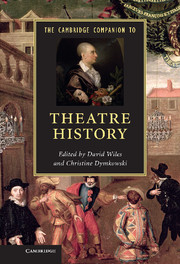Book contents
- Frontmatter
- Contents
- Illustrations
- Notes on Contributors
- Acknowledgements
- Part I Why?
- Part II When?
- Part III Where?
- Part IV What?
- Part V How?
- 15 The nature of historical evidence: a case study
- 16 The visual record: the case of Hamlet
- 17 Museums, archives and collecting
- 18 Re: Enactment
- 19 The internet: history 2.0?
- Index
- References
15 - The nature of historical evidence: a case study
from Part V - How?
Published online by Cambridge University Press: 05 February 2013
- Frontmatter
- Contents
- Illustrations
- Notes on Contributors
- Acknowledgements
- Part I Why?
- Part II When?
- Part III Where?
- Part IV What?
- Part V How?
- 15 The nature of historical evidence: a case study
- 16 The visual record: the case of Hamlet
- 17 Museums, archives and collecting
- 18 Re: Enactment
- 19 The internet: history 2.0?
- Index
- References
Summary
i
What do theatre historians do? How do they do it? Two simple questions, but the answers are complex, as I wish to demonstrate in this chapter on historical evidence. In order to provide some useful answers to these two questions, especially the how question, I will feature an event in theatre history that continues to generate controversy among theatre historians: the sudden death of the English playwright Christopher Marlowe (1564–93), who was killed on 30 May 1593. Marlowe’s death is a mystery to be solved. How and why did he die? How was the event understood at the time, and how has it been reconstructed in our own time? What does the evidence reveal or conceal? As this last question implies, I want to conduct an investigation of not only the historical event itself but also the interpretive methods that are used to reconstruct the event. I will therefore consider the relative value of several kinds of evidence (e.g., written versus oral sources, official versus unofficial statements, eyewitness versus hearsay reports). I will also identify some of the challenges and problems that theatre historians face in their methods of research and analysis.
I recognise, of course, that no single event can offer a full perspective on the wide range of topics and research methods in theatre studies. Theatre historians investigate all kinds of performance events that have occurred throughout human time and across the whole globe. This rich heritage of human entertainment is not limited to the performance of plays, but also includes festivals, parades, circuses, animal acts, cabarets, puppetry, variety and magic shows, and political spectacles. Moreover, besides these many kinds of performance events, theatre historians and biographers also study the lives, communities and social worlds of the people who create and participate in these events. Despite this great diversity of possible topics, there are still some basic methods of inquiry that guide historical research. For example, those two questions at the beginning of this chapter provide a vital clue to the fundamental procedures that theatre historians share with all historians. One sentence begins with the word ‘what’, the other with the word ‘how’. Those two interrogatives launch this chapter, and most historical inquiries. Looking back at historical events, we want to know what happened and how. In turn, we are also guided by four additional interrogatives: who, when, where and why.
- Type
- Chapter
- Information
- The Cambridge Companion to Theatre History , pp. 231 - 245Publisher: Cambridge University PressPrint publication year: 2012

